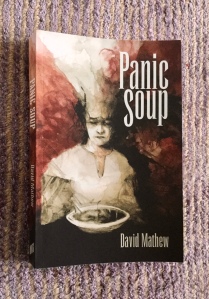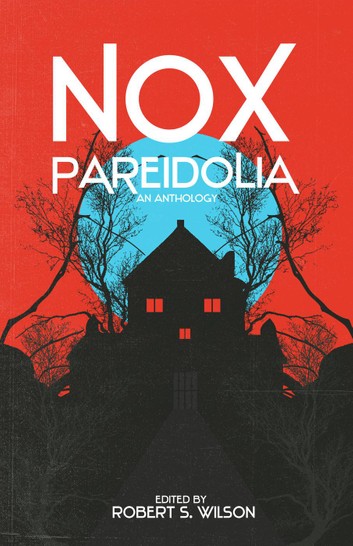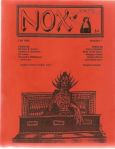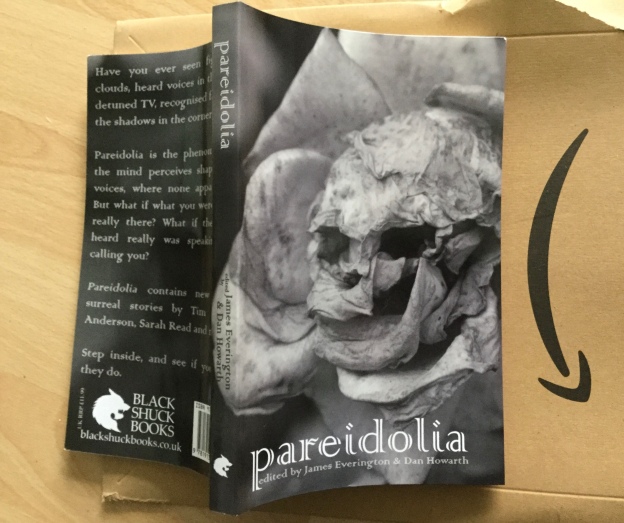Panic Soup – David Mathew


On the same momentous day as I real-time reviewed the amazing HEAD EXPLOSIONS by Steve Rasnic Tem, I received this new collection by David Mathew entitled PANIC SOUP, published by MONTAG 2019.
When I review the Mathew book, my thoughts will appear in the comment stream below.
My previous reviews of Mathew: https://dflewisreviews.wordpress.com/tag/david-mathew/
It’s a strange world today. Some of it’s bad, some of it’s good.


 My stories in NOX magazine:
My stories in NOX magazine:


 THE ROOM ABOVE by Brian Evenson
THE ROOM ABOVE by Brian Evenson THE TASTE OF ROT by Steve Toase
THE TASTE OF ROT by Steve Toase

You need a different angle as well as good luck to understand how the disparate events experienced by or involving Stuey in this story cohere – events too numerous to mention here – well, perhaps I’ll mention at least the conures, the ducks, the blizzard in New York, the long queue at the hotel reception, the change Stuey received increasingly being more than the cash proffered, his half brother and the latter’s now newly, by Las Vegas ceremony, married wife, the three of them on holiday together from Britain, Stuey by chance seeing a girl he had a crush on at school arriving in the queue at the hotel, and the chambermaid in the corridor, all the good luck, the flings, and the angle of approach to departure as represented by the story’s last three letters — a Jonah or jinx is fucked …. but depending on who or what does it to whom and how, it might be a blessing instead. No half measures either way. Fucking or being fucked can be good or bad depending what you get out of it or put into it. And the change received.
“Not thighed tell him”
As a young man, I loved the fruity in the local pub. And all the pub talk. Trite this story is not, although some of its swearing is. We did not swear so much in the sixties. Here a tale of illicit dealing in eponymosium. With spanners used as weapons and your woman at home who also got it in the neck in all the double-dealing gangsterisms. The piper calls the fee not the tune. And a car an intrinsic part of one’s body, so cherished they are. But who is Barry in the last paragraph? A morphing by the slid-over face of Ray? “YYY DELILAH”
“, stoned on lust,”
Just that, on the train underground system around Aldgate, with well-characterised believable named characters and a cello in free love play as a result of a capsule monster. I wonder why all the page numbers are halfway down the pages? Not spent, not fully erect, but in some limbo of lust, I guess. By the way, my own courtin’ was done through the original Summer of Love in 1967. One woman, one wife, then death. Trains like me rarely stray from their tracks, I guess.
A collaboration with Paul Meloy
Pipes, burnt shoes, moistened Rizlas, roulette-wheel silence, hopscotch grids, dustmen as angels, Blululululilly, this is a moving account of a web-designer woman with hips she deplores and her senilely demented Mother she is looking after in her small terraced house, the Mother often ‘escaping’ to the park. The daughter’s name is Delilah, senilely, lululilly…and one dustman a black angel but is Heaven’s dust golden, I wonder, and Samson’s torn locks mistaken for arms in the last paragraph. Or confused with burnt shoes.The mother and daughter as one, the single square on the grid at the top, two, one, two, one…Each of us the next roll-up. Smoking pipes. My own dementia already creeping in. All questions without question marks. The next spin of the wheel.
My previous reviews of Paul Meloy: https://dflewisreviews.wordpress.com/paul-meloy/
“At which he bent the cards nearly double; on their release, each card flew out from the family nest, describing an arc, and landed in the man’s other palm.”
Sort of follows the pattern of what happened in this engaging story, where a motley group, Lucy, the narrator, her brother, her lady confidante / companion, the latter’s nephew with ears she admired, and a religious man, or I may have forgotten someone and/or got those I have remembered mixed up, all in a waiting room during a storm, just like in that old Arthur Askey film.
“What Seb did was run a shower and take a razor from the cabinet.
He’d long since grown bored…”
The long-term relationship of Seb and Annie vividly seen by me as a parhelion. But which sun is the real sun? Seb and Annie with secrets from each other, but secrets that WE know as if putting their gestalt jigsaw together. The ending is chilling. But who has bowed out? Just nod your head.
Also this song was from the Scott Walker album ‘Tilt.’ Think about that after you read my thoughts below…
HELL OF A WEST
Annie enters a lonely windmill and meets Bonnie. This windmill feels like an oblique forerunner of the VanderMeer lighthouse. And, as an aside, Mathew’s word “unchristian” here is indeed the correct spelling of “unChristian”.
A collaboration with Lawrence Dyer
“Nothing like confronting yourself to gauge your bitch rating.”
“‘We went in there to watch evolution,’ the other me said, ‘in real time!’”
This story may send you mad in the future. Meanwhile, back then, this is an amazing portrait of a woman and her shopping and yearning for meat, this woman being a daytime shopper and the other woman (but still herself) at night, and they finally meet up, the same woman, bitch-confronting, amid a COinspiracy of agents and watchers called Quatilati Veris Ba, some physical fragmentations, a man called Utterson, some giant hedgehogs that travel on buses, and a supermarket trolley that may be your other self disguised then getting you into trouble with the store security by following you out with no checkout being done. Send you mad in the future? Well we’re all mad scientists already, I say! Meanwhile, again, best way to watch evolution in real-time is to read this story then look at the seascape paintings of Dyer, of which I have become a fan in more recent years.
“They’ll put that on the gravestone marker for this whole village. ‘They didn’t know how much was a dream and how much was real.’ Assuming of course there’s any difference anymore; and I’m not sure there is.”
The story of a modern couple, living in this village, beset by a shooting loony in a hideout, a career-minded husband and wife shot from the skies of their dreams as if they were pesky pigeons. But was this shooter the local farmer or someone who had already been shot down from the sky getting his own back? As I read this, I truly felt as if I was watching an award-winning film adaption of it.
“two pins of whiteness […] This River has more stars than there are numbers.”
Eventually, a poignant story of love and sweet regret. I thought at first it was confusing with both characters on London Bridge being he or him or his. Which was Sweet Tooth and who was dreaming of the eponymous rivereyes in the whiter shade of pale of Celeste (I happen by chance, to be listening to Procol Harum’s famous song as I write this, Tony Blackburn having just called it the summer of love, when I first met my future wife while this song was playing); a nostalgic memory of a wasp bite, I have one, too. Her face will burst just ghostly. I have my own aerial licence now.
“Today’s blood donation had been the worst yet, that zealous trainee ferreting his needle around in her bicep, gouging for a vein, like a helpful but incompetent electrician wielding a screwdriver in a fuse box, probing for a spark.”
Twins sisters who were once in alternating symbiosis with a man. And now one of them with their own sick mother. Some contacts are disposable, others not. But can twins have different blood groups? Do intruders only want to steal bruised vegetables and external gardening implements? Well, yes, if that is the path of least resistance into the vein, I guess.
DON’T DROWN THE MAN WHO TAUGHT YOU TO SWIM
A collaboration with D.F. Lewis
We are all part of a series of parhelion, I guess, one star drowning, the other not. This is a story of drowning by numbers, an accountancy exercise where one column is balanced, the other not, a synergy with the fallibility of spending and saving, sometimes illicitly, each column made up of capsule chambers, each chamber emptying of air till you manage to escape to the next. None of Chambers’ Lethal Chambers, just meaningful connections and coincidences. Sometimes just random references that one of us does not fully understand nor can connect into the gestalt. And so we go on. And I presume that, since this story was written years ago (and I now have no idea which of us wrote what in it), the universe has become a multiverse. And I am still not dead.
“You’re working for Des Lewis.”
No worse cunt than Des Lewis, I say. And there is mention here of another “fucking windmill”. A non-existent one, this time! No tilt left today in my träumtrawling.
Those who love this book will love this story, if they’re not the same thing anyway! They’re keeping my girl friend hostage, so I simply got to say that about it.
“He sniffed back an oil slick of mucus.”
I can’t actually believe that I must have read this story before, having published it in Nemonymous in 2003. It just now came up completely new to me. And it is a genuine classic, that ought to have been better known, and should be anthologised again and again. A story of an old man getting mixed up in his grandson’s video game as a French assassin, a game merging with other members of his family. It is that great. Also predictive of what I have become since 2003!
“The rattling of his joints; the shortness of breath. Memory problems — and a frequently insistent bladder…”
=======================================
WINDOW SHOPPING
“The way that Mark ignores the bitch makes her want him more: she italicises her body on the back seat.”
An ingenious, crisply written, nonchalantly amusing, bound-to-be-underrated story with a completely surprise ending. Not a long story, but a full plot. With glory-holes in their full glory. And cottaging at arm’s length. And a smooth trade as antidote or supplement to the rough.
Aptly it also has a puppy – and a pub called the Doghouse – as a follow-up to the previous story!
A collaboration with M.F. Korn
“The four televisions being always on, and tuned to the 24 hour news channels. Occasionally he thumbed the remote, but only to find new angles on same world events that everyone else was panicking about. He watched everything simultaneously.”
A telling tale of an OCD agoraphobic, suspicious even of his own shadow, I guess. The multifarious dangers of life that could take his own life. One day, uncharacteristically he is tempted to go to the aid of a dog stuck in someone’s car outside. The thoughts and wrangling of his mind are evocatively conveyed and the eventual outcome is a dressing down, so to speak. Should be anthologised and reantholigised as a potential classic story. It needs to be be put out there, at least. As for me, meanwhile, I felt like that mutt in the car. Perhaps every reader of this story feels the same.
You can read HAILING HELENE here: http://wordonymous.tripod.com/blog/index.blog/1852584/hailing-helene/ but I have not re-read and I cannot remember anything about it.
Melttimes, too, and seriously this is — possibly, arguably, once all has been read and all is accounted for — Mathew’s short story masterpiece, with sex-digging and shape-shafting, as coupled, nay, tripled or quadrupled, with identity floes calved from mixed-race icebergs of human-bodily parts. Starts deadpan and ordinary with a suspected burglar in one’s flat, and ends believably, not unbelievably, wild. Believe it or not.
WORTH
“Purple bruises appeared in the air — the air being dense and heavy — and Belswain saw in one of these bruises the little girl’s face:”
Now and again you read a new story (or new to you, at least) and you know straightaway it is something special, one to go straight into your canon of favourites. WORTH is about a man who accidentally knocked someone over in a car, and his father as passenger took responsibility of having been driving it. Later, when in the Utah desert, he encounters a man who had once captured an alien in a flying saucer… well, that only tells half the story; it all fits beautifully, utterly poignant as well as quirkily literary, and you know now why it must have been destined for you to read this truly great story while you were still concurrently reviewing two books both with PAREIDOLIA in their titles! (here and here)
“Before dying, he recalled that his great, great grandfather, when a child, had taken the book ‘The Young Traveller in Outer Space’ out of the library and forgotten to return it.”
“I’m sorry, she repeated — over breakfast, over joints, and as we queued for surfboards and for seafood. I’m sorry. As we bussed to the airport, as we sank rum doubles…”
A different bus journey now, and we need to scry the pareidolia of this text, a relatively short text unbroken by overt signs of changing scenes and times, a bus journey possibly reminiscent of one with different lunges and parries of destiny — love, disappointment then anger, exploitation, plot and counter plot, all leading to an ambush of meanings. A potential soup of panic. All wounds usually bleed. One’s hand trapped in the till or the groin or a slipped spine.
A collaboration with Lawrence Dyer
“Watching me watching myself,” Flynn explained. “Taking the pieces of my past — my real past — and twisting them into dramas for you. Including this: right now.”
As if I am the book that I am gestalt reviewing, the book that is me, but reading it for the first time in real-time. An amazing work, perhaps worth as much as WORTH, about the eponymous Irishman forced aka gratuitous serial killer of the woman in a pet shop who dodges his bullets by becoming his daughter. All for an audience watching through the implant in his eye. But it is even more disorientating, and I wonder who watched the watcher watching himself, who was tattooed to fix the identity of whom, who dyed the manthew.
“She clutched a teddy bear to her thin chest,”
A glimpse of Aristotelian entelechy in angels, angels named here perhaps for the first time (and maybe angles, unless the latter be typos?) while desires by angels for newly different raisons d’être can too easily eclipse such a strict hierarchy of intrinsic purpose. As happened with the Duke of York, a fact that culminated this week in my own real-time. Plucked his fruit too early in the Orchard.
“Opening the book arbitrarily I started reading halfway through ‘Coriolanus’.”
Randomly listening to Radio 3 earlier this morning, the Coriolan Overture by Beethoven came on. Had not heard it for years. This story, dare I say, is another work that can sit shoulder to shoulder with any other literary classic story. It is that good. The story of a boy, from his point of view, who at 12 had a road accident and found himself sadly depleted, browbeaten by parental forces, given a speech therapist, trying to walk, managing, at 15, to talk with his own fingertips, finally talking them into something as catharsis or purging…
“Advance, my fellows!”
― William Shakespeare, Coriolanus (my own quote from the play, not this story’s)
Many throwaway lines in different family whorls at an insufferable wedding anniversary reception where two brothers and their sister attend, with talk of various tangled relationships and new babies. Could have thrown it all away without diminishing this book, I guess. But that would have removed the sole reference to Clacton in literature.
A collaboration with Paul Meloy
“I’m thinking about the sea, about drowning, about all sorts of shit.”
A man who spurns this woman surely should expect what he gets in return, catch his death, in fact, have his luck docked. His privileges cancelled. And he does. And so do his mates, one of whom is “drowned in his over-sized suit and clown-cloppy shoes.” Psychotic DIY, “not every day that a maniac nails your entrance door shut.” It as if some people have leverage on your own gestalt, The ability to rejuggle the past, for good or ill, whatever the Klee print on the wall.
“That is why I have doused my body, from head to foot, in cold water. As some of it dries, it’s like floating, or falling, from the sea into the clouds.”
“‘You’re their engine. They think you’re going to help them come back.’
‘Nose-first,’ said Mick.”
Ghosts, that is.
Starting with a noxious smell that only one of the Sapphic couple (Tina and Mick/Michaela) can smell, a rogue rat near the tall-boy being suspected, but it turns out to be what I infer to be Gogol’s nose (cf William’s Bridge here a few days ago: https://dflewisreviews.wordpress.com/2019/11/09/the-illiterate-ghost-alan-price/#comment-17397) One of the couple dreams of Rapscullion as a giant rat then as the second policeman, if not the third, come to investigate. Hello, hello, who knows what this is all about!
“It took great mental energy but she was free to float, and into the big wide world she ventured, using her mind as an engine.”
…and I now know that Rapscallion was due to become a prelude to this story as an engine for a ghost. This ghost is Diana, a depressed actress who takes her own life and then mingles with another woman via a planchette. The latter transcribes Diana’s autobiography, inter alia. A story from the point of view of the ghost. That’s how fiction works, I suddenly realise. Becomes more than just fiction.
“…is visited by the second police officer…”
If not the third?
On the cover of this book, I recently noticed this written: “’Panic Soup’ is my third and final collection of short stories.” I happen to know that this author is relatively young compared to myself and I would like to know how he knows this is his last collection. Or I suppose there could already be an old conniving ghost whose words the author is transcribing here — or the author himself fully intends to commit dignitas and this incomprehensible story is his way of doing it, drowning in Gangullus…
end